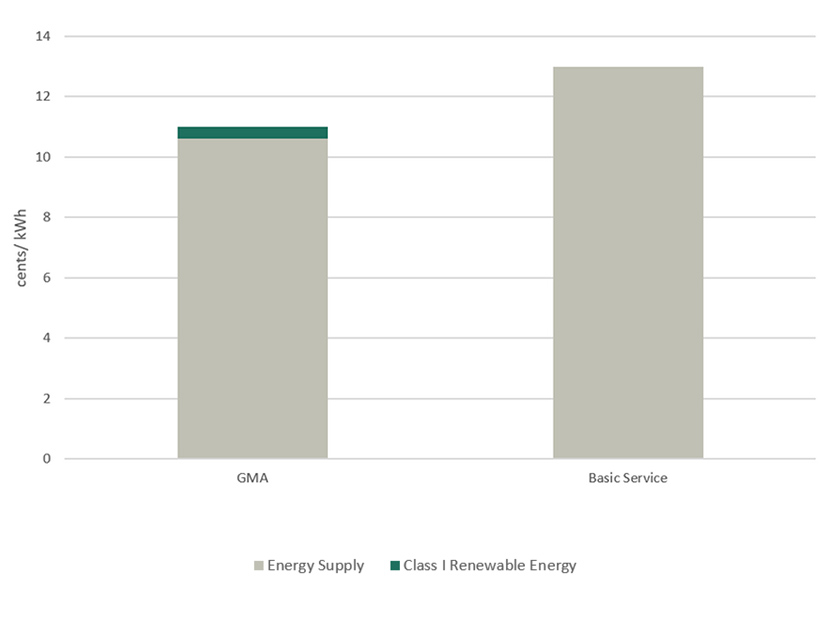Green municipal aggregation (GMA) programs have cut costs for consumers in Massachusetts while lowering emissions, according to a new report by the Green Energy Consumers Alliance (GECA). However, the slow rate of approvals of new municipal aggregations at the state’s Department of Public Utilities (DPU) has limited the reach of these programs, researchers said.
GMAs are a type of community choice aggregation, which enables a municipality to buy electricity in bulk for ratepayers. GMAs include higher amounts of renewable energy certificates (RECs) than are required by the state’s Renewable Portfolio Standard (RPS). The RPS requires electricity suppliers to acquire a minimum number of RECs based on the amount of electricity they supply.
The researchers at GECA — a clean energy advocacy group that supports expanding municipal aggregation programs — compared the costs of 41 GMA programs to the basic service rates offered by the state’s investor-owned utilities from August 2017 to October 2023. The GMA programs included in the study had 5-11% more Class I RECs than the state’s RPS requirement.
The study estimated the active GMAs across the state are “adding approximately 1 million megawatt hours of renewable energy to the grid above and beyond RPS requirements per year,” equal to the power demand from 150,000 to 200,000 homes, largely displacing natural gas generation.
“That’s a pretty good number, and it’s gravy all on top of the state’s renewable portfolio standard,” said Larry Chretien, a co-author of the report and the executive director of GECA.
Regarding cost savings, the report found GMA customers saved an average of 3.3 cents per kWh compared to standard utility rates, equaling $200-$237 of annual savings for a household that averages 500-600 kWh per month.
These savings largely came from the ability of municipal aggregations to time their bids for energy supply when prices are lower, compared to the fixed schedule of supply procurements required for utility basic service, the study said.
Although GMA rates typically were lower than utility basic service, they were marginally higher than municipal aggregations that did not exceed the number of RECs required by the state’s RPS, Chretien told NetZero Insider.
“For every 5% of additional RECs that you include, it adds roughly 0.2 cents per kilowatt hour,” Chretien said. He noted that the increased cost of GMAs compared to typical municipal aggregations is small relative to the savings over utility rates and that customers can choose to opt out of the GMA to get the lowest price.
While GMAs have delivered significant benefits for Massachusetts residents, the report singled out the slow pace of municipal aggregation application approvals at the state DPU as a barrier to increased implementation.
Several municipalities have been waiting in the DPU’s queue for multiple years. There are 23 aggregation plans pending before the DPU, while only one new community has received an order of approval since the start of 2022.
In August, the DPU announced a proceeding to create guidelines for the municipal aggregation approval process and proposed an “expedited review process” for aggregation plans that comply with an established template (D.P.U. 23-67). The new guidelines are aimed at streamlining the approval process while making sure ratepayers are properly informed and protected.
“Municipal aggregation is an important tool for communities to utilize clean energy, provide ratepayers with more flexibility, and help cities and towns pursue our collective clean energy and climate goals,” DPU Chair Jamie Van Nostrand told NetZero Insider in a statement. “Addressing these delays is a top priority for the DPU, and we look forward to announcing finalized guidelines that will help facilitate a timely review of applications.”
The DPU’s proposal has received pushback from municipalities and other stakeholders (including the state’s Department of Energy Resources) for limiting the flexibility available to communities.
“Quite frankly, we’re disappointed in what they proposed,” Chretien said. GECA’s study concluded it’s debatable whether “the proposed guidelines and templates would adequately support the municipal aggregation model or further impinge the model’s ability to bring economic and environmental benefits to the Commonwealth.”
In response to a large number of comments, the DPU recently scheduled a technical session Dec. 20 to discuss the proposal with stakeholders.
Meanwhile, GECA is supporting legislation introduced in the Massachusetts House and Senate which would impose a 90-day timeline on the DPU to approve aggregation plans and amendments.




